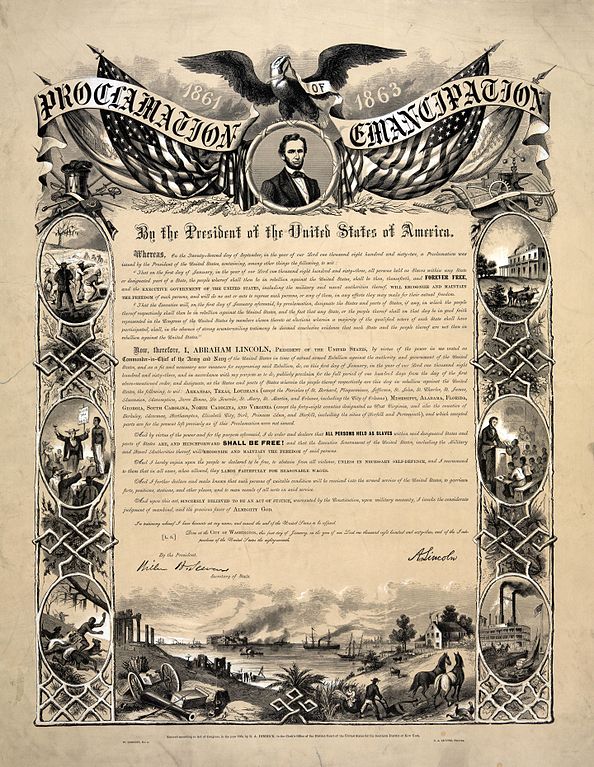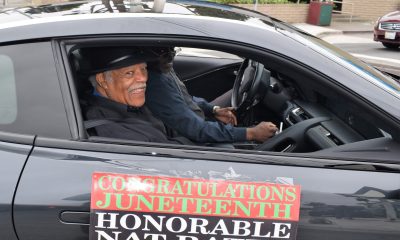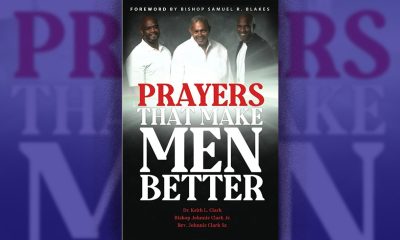History
Opinion: The Spirit of the Emancipation Proclamation is Under Attack Again Today


Rev. Jesse Jackson Sr.
Wednesday, Jan. 1, begins the new year. It also marks the anniversary of a new America.
On Jan. 1, 1863, as the Civil War, the bloodiest of America’s wars, approached the end of its second year, President Abraham Lincoln issued the Emancipation Proclamation, declaring “that all persons held as slaves” within the rebellious states “are and henceforward shall be free.”
The Proclamation was limited to fit wartime necessities. It applied only to the states that had seceded from and were at war with the United States, leaving slavery untouched in loyal border states. It also exempted the parts of the Confederacy that had already come under Northern control. And, of course, the freedom it promised depended on the victory of the North.
Yet, the Proclamation’s effect was far more expansive than its terms. It transformed the war into a war of freedom. As the U.S. Archives summarizes, “Every advance of federal troops expanded the domain of freedom.” And of course, it dramatically aided the Union cause, with nearly 200,000 Black soldiers and sailors fighting for the Union.
The Proclamation was the beginning. Upon victory, Congress passed three amendments to the Constitution — the 13th, 14th and 15th Amendments — designed to finish the job of transforming the country that was, in the words of Abraham Lincoln, “half slave and half free” to one in which all were guaranteed — under the Constitution — the” blessings of liberty.”
The 13th Amendment outlawed slavery and involuntary servitude; the 14th began to define the rights of citizens and guaranteed equal protection under the law; the 15th prohibited discrimination in the right to vote on the basis of “race, color, or previous condition of servitude.” (Ironically, the Constitution still does not guarantee the right to vote to all).
The amendments, forced upon the defeated Southern states as a condition for re-entry into the Union, launched the reconstruction that sought for a few short years to bring the country together. Newly empowered Blacks joined with progressive whites to build coalitions that transformed state constitutions, guaranteeing the right to education, launching programs to provide more equal justice under the law.
Sadly, Reconstruction met with fierce reaction across the South. Segregation masters succeeded the slave masters. The Ku Klux Klan, formed by the elites of Southern communities, terrorized newly freed Blacks. The right to vote was sabotaged by various tricks and traps, from the poll tax to unequally administered tests on the Constitution, to simple threat and terror. In 1896, the Supreme Court to its shame ruled that apartheid — the mythic “separate but equal” standard — was legal in the United States. By the turn of the century, segregation was the law of the land.
It took 100 years and the historic civil rights movement to overturn that reaction, and to begin to reclaim the promise of equal justice under the law and the revive the right to vote. The civil rights struggle, which united the movement of courageous citizens on the ground with the force of Lyndon Johnson in the White House, produced, among other legislation, the Civil Rights Act and the Voting Rights Act that brought America closer to its promise.
Today, we once more see the stirrings of reaction against that reconstruction. Racial division, stoked cynically from the highest offices in the land, once more is on the rise. African Americans, Latinos, Jews, Muslims, gays, women — all once more feel the rise of resentment and often of hate. The Supreme Court has gutted a critical part of the Voting Rights Act. States under reactionary governors are inventing new ways to restrict access to the vote.
Will this reaction be as successful as that which undermined the promise of the Emancipation Proclamation? America, I believe, is better than that. Our democracy is stronger than it was then. We can mobilize and vote in large numbers to keep expanding the domain of freedom.
On this Jan. 1, let us remember the Emancipation Proclamation, signed by the greatest of our presidents, a Republican, and devote ourselves to redeeming its promise.
Bay Area
BART to Retire Legacy Trains in Public Ceremony April 20

The Richmond Standard
Bay Area Rapid Transit’s final dispatch of legacy trains will take place on Saturday, April 20, and will be accompanied by a retirement ceremony and a final legacy ride.
At 1 p.m., the public is invited to celebrate the last run of BART’s legacy trains during a ceremony that will take place in the free area of the plaza at MacArthur Station in Oakland.
Following the ceremony, the public is invited to board a legacy train and ride from MacArthur to Fremont Station, mirroring the initial service BART provided when it opened Sept. 11, 1972.
“It’s a 45-minute trip that travels along approximately 24 miles of the original section of tracks,” BART officials said.
Multiple legacy trains will run for the event, and all will make station stops and may turn around at Bay Fair depending on the number of attendees waiting to ride. Regular fares will apply.
“These train cars are part of the history of the Bay Area,” said Bob Powers, BART general manager. “While we are excited to modernize the system, we recognize the profound cultural importance of these cars, and we want to celebrate their rich history and give them a proper send off.”
BART is now running train cars from its Fleet of the Future project.
Those nostalgic for the older trains will be able to view three of them soon at Western Railway Museum in Suisun City.
A handful of other legacy cars will be transferred to be repurposed for short-term rentals, entertainment venues, and training facilities, according to BART. Most of the legacy cars have been recycled.
Activism
Oakland Schools Honor Fred Korematsu Day of Civil Liberties
Every Jan. 30, OUSD commemorates the legacy of Fred Korematsu, an Oakland native, a Castlemont High School graduate, and a national symbol of resistance, resilience, and justice. His defiant stand against racial injustice and his unwavering commitment to civil rights continue to inspire the local community and the nation. Tuesday was “Fred Korematsu Day of Civil Liberties and the Constitution” in the state of California and a growing number of states across the country.

By Post Staff
Every Jan. 30, OUSD commemorates the legacy of Fred Korematsu, an Oakland native, a Castlemont High School graduate, and a national symbol of resistance, resilience, and justice.
His defiant stand against racial injustice and his unwavering commitment to civil rights continue to inspire the local community and the nation. Tuesday was “Fred Korematsu Day of Civil Liberties and the Constitution” in the state of California and a growing number of states across the country.
One OUSD school is named in his honor: Fred T. Korematsu Discovery Academy (KDA) elementary in East Oakland.
Several years ago, founding KDA Principal Charles Wilson, in a video interview with anti-hate organization “Not In Our Town,” said, “We chose the name Fred Korematsu because we really felt like the attributes that he showed in his work are things that the children need to learn … that common people can stand up and make differences in a large number of people’s lives.”
Fred Korematsu was born in Oakland on Jan. 30, 1919. His parents ran a floral nursery business, and his upbringing in Oakland shaped his worldview. His belief in the importance of standing up for your rights and the rights of others, regardless of race or background, was the foundation for his activism against racial prejudice and for the rights of Japanese Americans during World War II.
At the start of the war, Korematsu was turned away from enlisting in the National Guard and the Coast Guard because of his race. He trained as a welder, working at the docks in Oakland, but was fired after the bombing of Pearl Harbor in 1941. Fear and prejudice led to federal Executive Order 9066, which forced more than 120,000 Japanese Americans out of their homes and neighborhoods and into remote internment camps.
The 23-year-old Korematsu resisted the order. He underwent cosmetic surgery and assumed a false identity, choosing freedom over unjust imprisonment. His later arrest and conviction sparked a legal battle that would challenge the foundation of civil liberties in America.
Korematsu’s fight culminated in the Supreme Court’s initial ruling against him in 1944. He spent years in a Utah internment camp with his family, followed by time living in Salt Lake City where he was dogged by racism.
In 1976, President Gerald Ford overturned Executive Order 9066. Seven years later, the 9th Circuit Court of Appeals in San Francisco vacated Korematsu’s conviction. He said in court, “I would like to see the government admit that they were wrong and do something about it so this will never happen again to any American citizen of any race, creed, or color.”
Korematsu’s dedication and determination established him as a national icon of civil rights and social justice. He advocated for justice with Rosa Parks. In 1998, President Bill Clinton gave him the Presidential Medal of Freedom saying, “In the long history of our country’s constant search for justice, some names of ordinary citizens stand for millions of souls … To that distinguished list, today we add the name of Fred Korematsu.”
After Sept. 11, 2001, Korematsu spoke out against hatred and discrimination, saying what happened to Japanese Americans should not happen to people of Middle Eastern descent.
Korematsu’s roots in Oakland and his education in OUSD are a source of great pride for the city, according to the school district. His most famous quote, which is on the Korematsu elementary school mural, is as relevant now as ever, “If you have the feeling that something is wrong, don’t be afraid to speak up.”
Black History
Matthew Henson: Explorer Extraordinaire
Matthew Henson, a trailblazing explorer who overcame countless obstacles to leave an incredible mark on history. Born on August 8, 1866, in Charles County, Maryland, his journey is a testament to the power of determination and the spirit of adventure.

By Tamara Shiloh
Matthew Henson, a trailblazing explorer who overcame countless obstacles to leave an incredible mark on history. Born on August 8, 1866, in Charles County, Maryland, his journey is a testament to the power of determination and the spirit of adventure.
Henson’s life began amidst the backdrop of post-Civil War America, where opportunities for African Americans were scarce. From a young age, he possessed an insatiable curiosity about the world beyond his small town. At the age of 12, he embarked on a journey that would change the course of his life forever when he joined a merchant ship as a cabin boy.
His most famous expedition was his journey to the Arctic with renowned explorer Robert E. Peary. In 1887, Henson joined Peary’s crew as a seaman and quickly proved himself to be invaluable with his skills as a navigator and craftsman. Over the course of several expeditions, Matthew endured extreme cold, treacherous terrain, and grueling conditions as he and Peary sought to reach the elusive North Pole.
In 1908–09, Peary set out on his eighth attempt to reach the North Pole. It was a big expedition, with Peary planning to leave supplies along the way. When he and Henson boarded their ship, the Roosevelt, leaving Greenland on August 18, 1909, they were joined by a large group. This included 22 Inuit men, 17 Inuit women, 10 children, 246 dogs, 70 tons of whale meat, blubber from 50 walruses, hunting gear, and tons of coal.
In February, Henson and Peary left their anchored ship at Ellesmere Island’s Cape Sheridan, along with the Inuit men and 130 dogs. They worked together to set up a trail and supplies along the way to the Pole.
Peary picked Henson and four Inuit people to join him in the final push to the Pole. However, before they reached their destination, Peary couldn’t walk anymore and had to ride in a dog sled. He sent Henson ahead to scout the way. In a later interview with a newspaper, Henson recalled being in the lead and realizing they had gone too far. The group turned back, and Henson noticed his footprints helped guide them to their destination. At that location, Henson planted the American flag.
Henson’s legacy extends far beyond his expeditions to the Arctic. He shattered racial barriers in the world of exploration and inspired countless individuals, regardless of race, to dream big and pursue their passions. In 1937, he was finally recognized for his achievements when he was inducted into The Explorers Club, an organization dedicated to promoting scientific exploration and field research.
Matthew Henson died in the Bronx, New York, on March 9, 1955, at the age of 88.
-

 Activism3 weeks ago
Activism3 weeks agoOakland Post: Week of March 27 – April 2, 2024
-

 #NNPA BlackPress4 weeks ago
#NNPA BlackPress4 weeks agoCOMMENTARY: D.C. Crime Bill Fails to Address Root Causes of Violence and Incarceration
-

 #NNPA BlackPress4 weeks ago
#NNPA BlackPress4 weeks agoFrom Raids to Revelations: The Dark Turn in Sean ‘Diddy’ Combs’ Saga
-

 #NNPA BlackPress4 weeks ago
#NNPA BlackPress4 weeks agoCOMMENTARY: Lady Day and The Lights!
-

 #NNPA BlackPress4 weeks ago
#NNPA BlackPress4 weeks agoMayor, City Council President React to May 31 Closing of Birmingham-Southern College
-

 #NNPA BlackPress4 weeks ago
#NNPA BlackPress4 weeks agoBaltimore Key Bridge Catastrophe: A City’s Heartbreak and a Nation’s Alarm
-

 #NNPA BlackPress4 weeks ago
#NNPA BlackPress4 weeks agoBaltimore’s Key Bridge Struck by Ship, Collapses into Water
-

 #NNPA BlackPress4 weeks ago
#NNPA BlackPress4 weeks agoBeloved Actor and Activist Louis Cameron Gossett Jr. Dies at 87





















































